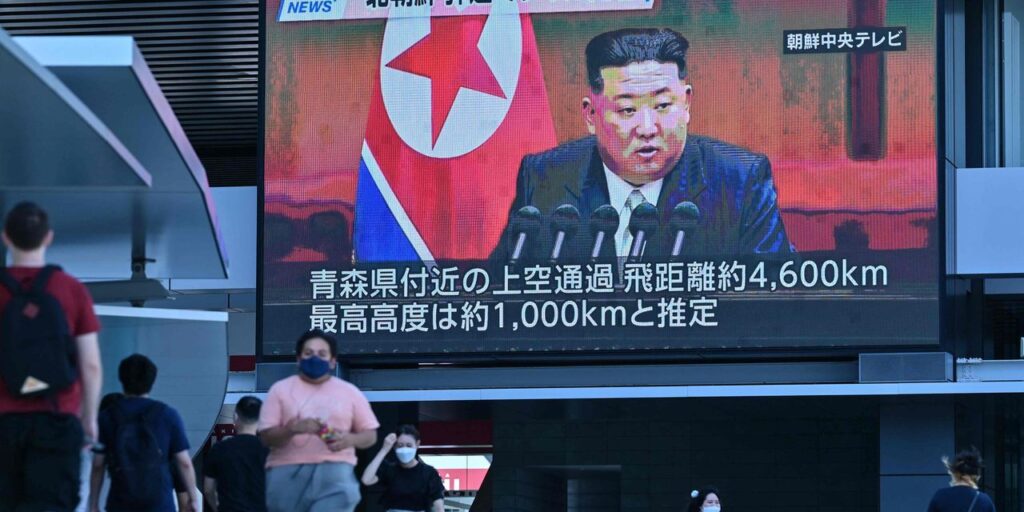
North Korea fired two short-range ballistic missiles early Sunday morning, Seoul officials said, as Pyongyang expressed defiance against the global backlash to its barrage of weapons tests.
The missiles were fired between 1:48 a.m. and 1:58 a.m. local time near the North’s east coastal city of Munchon, according to Seoul’s military. They hit estimated altitudes of roughly 56 miles, traveling about 217 miles before splashing into the waters between the Korean Peninsula and Japan, Seoul and Tokyo officials said.
The Japanese coast guard warned ships to be alert while South Korea’s military condemned the launch as a grave provocation in violation of United Nations Security Council resolutions.
The Japanese Defense Ministry said the two missiles fell outside of the country’s maritime exclusive economic zone, which extends about 200 nautical miles from the coast.
The latest test came ahead of a major North Korean holiday—the 77th founding anniversary of its ruling Workers’ Party—on Monday. Pyongyang doesn’t appear to be planning a military parade as part of the celebrations.
Pyongyang has conducted more than two dozen rounds of missile launches this year, the most it has ever done in a single year. North Korea has unleashed seven tests in the past two weeks alone—including launching a missile over Japan for the first time in five years on Tuesday—amid combined naval exercises between the U.S., Japan and South Korea.
The launches violate U.N. Security Council resolutions. But U.S.-led efforts to heap additional penalties on North Korea have been blocked by Russia and China, which advocate a relaxing of sanctions. North Korean leader Kim Jong Un has recently said he would never surrender his nuclear weapons to counter the U.S. Pyongyang has rebuked the Biden administration’s repeated offers to meet, and formal denuclearization talks haven’t occurred in three years.
On Saturday, North Korea defended its recent spate of missile launches as a “regular and planned self-defensive step” against threats from the U.S., according to Pyongyang’s state media. The tests didn’t pose a threat to neighboring countries or harm civil aviation, an unnamed spokesman for the National Aviation Administration said.
The Saturday statement was a response to action taken the prior day by the International Civil Aviation Organization, a U.N. body promoting cooperation on air transport, which condemned North Korea’s missile launches as a serious safety risk to international aviation.
North Korea promised to “take tougher countermeasures” against any attempts from the “U.S. and other hostile forces to isolate and stifle” the country through the international air-transport group.
Outlining his ambitions for a five-year weapons strategy in January 2021, Mr. Kim promised technology the world has never seen. Since then, North Korea has displayed railway-launched missiles, hypersonic weapons and other advances. In March, Pyongyang launched an intercontinental ballistic missile for the first time since 2017, breaking a self-imposed moratorium on long-range testing.
The intermediate-range weapon launch over Japan traveled over the country’s northern prefectures before landing in the Pacific Ocean. At about 2,800 miles, it represented the farthest the Kim regime had ever flown a missile in a test. As the missile soared over Japan, the Japanese government issued emergency warnings for citizens to take cover and drew international condemnation.
The U.N. Security Council, at an emergency meeting, failed to endorse any new actions against North Korea. Earlier this year, Russia and China vetoed new sanctions proposed in response to North Korea’s ICBM test in March.
North Korea, in a statement issued by its defense ministry on Saturday, called the recent trilateral anti-submarine exercises by Washington, Tokyo and Seoul “extremely provocative and threatening.”
North Korea’s acceleration in weapons testing has sparked alarm for the U.S. and its allies, who have responded with missile launches of their own and joint military exercises. Following the missile test over Japan, the U.S. redeployed the USS Ronald Reagan aircraft carrier to waters near the Korean Peninsula this week, a move South Korean authorities said was a show of readiness to deal with Pyongyang’s provocations.
On Friday, the Biden administration imposed new U.S. sanctions on two people and three entities connected to delivering refined petroleum to North Korea, supporting the development of Pyongyang’s weapons program, the State Department said.
Seoul officials have warned that Pyongyang is ready to conduct its seventh nuclear test, which they say could occur in the coming weeks.
—Chieko Tsuneoka in Tokyo contributed to this article.
Write to Peter Landers at peter.landers@wsj.com and Dasl Yoon at dasl.yoon@wsj.com
Copyright ©2022 Dow Jones & Company, Inc. All Rights Reserved. 87990cbe856818d5eddac44c7b1cdeb8
